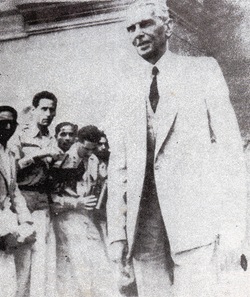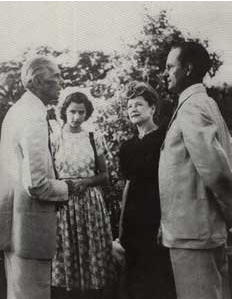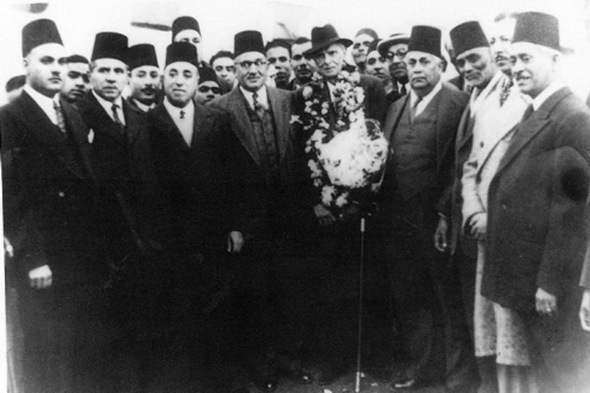The founding of Pakistan by Quaid-i-Azam Mohammad Ali Jinnah so greatly dominates his political life and career that his other roles are bound to be ignored. One important role which Jinnah played in the politics of India was for the achievement of unity between the Hindus and Muslims by bringing about some understanding between the Indian National Congress and the All India Muslim League. In fact, for more than two decades Jinnah was known more for this role than for any other. It will be recalled that Gopal Krishna Gokhale expressed the view that Jinnah “has true stuff in him and that freedom from all sectarian prejudice which will make him the best ambassador of Hindu-Muslim unity.”1 Mrs. Sarojini Naidu, who compiled Jinnah’s speeches and writings in 1918 gave the volume the sub-title An Ambassador of Unity and wrote that Jinnah stood “approved and confirmed by his countrymen not merely as an ambassador, but as an embodied symbol of Hindu-Muslim unity.”2 Similarly, Jawahar Lal Nehru, who strongly differed from Jinnah on several political issues, wrote in 1936 that Jinnah had been “largely responsible in the past for bringing the Moslem League nearer to the Congress.”3 The fact is that Jinnah continued to work for unity between the Hindus and Muslims until he was convinced early in 1940 that the Hindu leaders were not at all prepared for any kind of understanding. The purpose of this paper is to discuss this aspect of Jinnah’s political life.
The Evolution of the Quaid-e-Azam - A Personal Observation
The reputation of the Quaid-i-Azam Muhammad Ali Jinnah as the champion of Muslim rights, as the protagonist of the Two Nation Theory and as the Founding Father of Pakistan is so secure that I feel we may be in some danger of forgetting the long road which he had to travel before he could emerge as the Leader of the greatest Muslim mass-movement of our time. In saying this I do not refer only to the slow process of uniting sections or the Muslim community, deeply divided as they were in aims and outlook, in pursuit of a common objective, but also the struggle which went on in his own mind as hard facts compelled him to discard certain of the ideas which had inspired him to attain the first rank among Leaders of the All India Nationalist movement. This mental revolution, if I may use the term, was painful enough to drive him into temporary political exile, from which he only emerged when he had adjusted his thinking to meet the needs of a new situation. Experience had taught him, as it had taught the famous Florentine statesman, the deadly danger of mistaking things as they are for things as we would like them to be.
As a young contemporary of Muhammad Ali Jinnah – he was only thirteen years of age when I was born – I was privileged to follow his career in some details, and, indeed, to come into close contact with him at some of the turning points by which that career was marked. While it was still at school I began to see Mr. Jinnah’s name in print. I gathered that when he was only sixteen years old, his Father, a shrewd Khoja businessman of Karachi, had sent him to England to read for the Bar examinations; that when in England, he had come under the influence of that Grand Old Man of the Indian Nationalist Movement, Dadabhai Naoroji, then President of the Indian Society in London, and one of the founding members of the Indian National Congress. The young Jinnah became an enthusiastic convert to Congress ideas; and when, as a newly qualified Barrister, a decline in the family fortunes obliged him to seek wider opportunities than his native city of Karachi could offer, he migrated to Bombay, he found himself in a society which was already among the most flourishing seedbeds of these ideas in the India of the day. Jinnah was, it seemed, particularly attracted by the personality and outlook of Gopal Krishna Gokhale, who, on his part was delighted to find in Jinnah a man after his own heart. He wrote to him: “He has the true stuff in him; and that freedom from all sectarian prejudice which will make him the best ambassador of Hindu Muslim unity”. By 1996 Jinnah was not only building up a lucrative practice at the Bombay Bar; he was marked as a rising political figure. In that same year he acted as Secretary to Dadabhai Naoroji at the Calcutta meeting of the Indian National Congress when the ideal of self-government for India was formally adopted as a Congress objective.
As a young contemporary of Muhammad Ali Jinnah – he was only thirteen years of age when I was born – I was privileged to follow his career in some details, and, indeed, to come into close contact with him at some of the turning points by which that career was marked. While it was still at school I began to see Mr. Jinnah’s name in print. I gathered that when he was only sixteen years old, his Father, a shrewd Khoja businessman of Karachi, had sent him to England to read for the Bar examinations; that when in England, he had come under the influence of that Grand Old Man of the Indian Nationalist Movement, Dadabhai Naoroji, then President of the Indian Society in London, and one of the founding members of the Indian National Congress. The young Jinnah became an enthusiastic convert to Congress ideas; and when, as a newly qualified Barrister, a decline in the family fortunes obliged him to seek wider opportunities than his native city of Karachi could offer, he migrated to Bombay, he found himself in a society which was already among the most flourishing seedbeds of these ideas in the India of the day. Jinnah was, it seemed, particularly attracted by the personality and outlook of Gopal Krishna Gokhale, who, on his part was delighted to find in Jinnah a man after his own heart. He wrote to him: “He has the true stuff in him; and that freedom from all sectarian prejudice which will make him the best ambassador of Hindu Muslim unity”. By 1996 Jinnah was not only building up a lucrative practice at the Bombay Bar; he was marked as a rising political figure. In that same year he acted as Secretary to Dadabhai Naoroji at the Calcutta meeting of the Indian National Congress when the ideal of self-government for India was formally adopted as a Congress objective.
Quaid-e-Azam Mohammad Ali Jinnah and Fundamental Human Rights
By Sharifuddin Pirzada
 Quaid-e-Azam always believed in and stood for human rights. In pre-Partition period he championed the cause of liberty, freedom of speech and association and other rights. In the Eighteenth Annual Session of the Muslim League held at Delhi in December 1926, Quaid-e-Azam proposed a resolution demanding that the Government of India Act 1919 should be revised and that without delay a Royal Commission be appointed to formulate a scheme so as to place Indian Constitution on a sound and permanent basis with provisions to establish full responsible Government in India.The resolution further demanded that any scheme of the future of Constitution of India should secure and guarantee, among others, the following basic and fundamental principles.
Quaid-e-Azam always believed in and stood for human rights. In pre-Partition period he championed the cause of liberty, freedom of speech and association and other rights. In the Eighteenth Annual Session of the Muslim League held at Delhi in December 1926, Quaid-e-Azam proposed a resolution demanding that the Government of India Act 1919 should be revised and that without delay a Royal Commission be appointed to formulate a scheme so as to place Indian Constitution on a sound and permanent basis with provisions to establish full responsible Government in India.The resolution further demanded that any scheme of the future of Constitution of India should secure and guarantee, among others, the following basic and fundamental principles.
"Full religious liberty i.e. liberty of belief, worship, observances, propaganda, association and education shall be guaranteed to all communities."
In the famous Fourteen Points formulated by the Quaid-e-Azam on March 28, 1929, point No.7 embodied the provisions relating to liberty, association, education, belief and other fundamental rights and it was demanded that such rights should be guaranteed to all the communities.
 Quaid-e-Azam always believed in and stood for human rights. In pre-Partition period he championed the cause of liberty, freedom of speech and association and other rights. In the Eighteenth Annual Session of the Muslim League held at Delhi in December 1926, Quaid-e-Azam proposed a resolution demanding that the Government of India Act 1919 should be revised and that without delay a Royal Commission be appointed to formulate a scheme so as to place Indian Constitution on a sound and permanent basis with provisions to establish full responsible Government in India.The resolution further demanded that any scheme of the future of Constitution of India should secure and guarantee, among others, the following basic and fundamental principles.
Quaid-e-Azam always believed in and stood for human rights. In pre-Partition period he championed the cause of liberty, freedom of speech and association and other rights. In the Eighteenth Annual Session of the Muslim League held at Delhi in December 1926, Quaid-e-Azam proposed a resolution demanding that the Government of India Act 1919 should be revised and that without delay a Royal Commission be appointed to formulate a scheme so as to place Indian Constitution on a sound and permanent basis with provisions to establish full responsible Government in India.The resolution further demanded that any scheme of the future of Constitution of India should secure and guarantee, among others, the following basic and fundamental principles."Full religious liberty i.e. liberty of belief, worship, observances, propaganda, association and education shall be guaranteed to all communities."
In the famous Fourteen Points formulated by the Quaid-e-Azam on March 28, 1929, point No.7 embodied the provisions relating to liberty, association, education, belief and other fundamental rights and it was demanded that such rights should be guaranteed to all the communities.
Dear Mr. Jinnah
Dear Mr. Jinnah,
I don’t think I ever got down to thanking you for your efforts in helping form Pakistan. I was born thirty-six years after you and a team of dedicated, patriotic and self-less leaders inspired the Muslims of India to separate themselves in pursuit of an independent nation. Hundreds of thousands of people lost their lives so that future generations like mine can live in a sovereign state. Thank you.
Things now aren’t as great as you visioned them to be though.
The religion you made the basis for separation is now divided within itself. It’s being abused, sabotaged and exploited by everyone who has the capability to do so. Islam meant peace. Now, it’s being cited as the root of everything otherwise.
The poor, helpless people whose rights you fought for aren’t poor or helpless anymore. They have become poor-er and more helpless.
You remember the overly rich and greedy people of your time? They still roam dauntlessly, sucking the blood of the common man and giving him nothing in return but grief, sickness and death.
There is no faith. There is no unity. There is no discipline.
I don’t think I ever got down to thanking you for your efforts in helping form Pakistan. I was born thirty-six years after you and a team of dedicated, patriotic and self-less leaders inspired the Muslims of India to separate themselves in pursuit of an independent nation. Hundreds of thousands of people lost their lives so that future generations like mine can live in a sovereign state. Thank you.
Things now aren’t as great as you visioned them to be though.
The religion you made the basis for separation is now divided within itself. It’s being abused, sabotaged and exploited by everyone who has the capability to do so. Islam meant peace. Now, it’s being cited as the root of everything otherwise.
The poor, helpless people whose rights you fought for aren’t poor or helpless anymore. They have become poor-er and more helpless.
You remember the overly rich and greedy people of your time? They still roam dauntlessly, sucking the blood of the common man and giving him nothing in return but grief, sickness and death.
There is no faith. There is no unity. There is no discipline.
The Creative Process of Founding a State
I
This paper suggests that the creation of a State by its very nature is not the work of one man. It is a joint product of a number of historical forces. The great man –the Quaid-i-Azam – who played a dominant role was himself conditioned by certain historical forces. There was not one Jinnah but at least two. There was the Jinnah of the early phase, which lasted until late thirties or even very early forties. The Jinnah of this phase was almost entirely constitutional or the rational or the westernized and aloof Jinnah. Jinnah in his second phase has been transformed by the current of Muslim mass support for the idea of a separate Muslim state.The other major conceptual component of this paper is the idea of the founder of a state as distinct (analytically) from a leader of a nationalist movement like Gandhi or a visionary or a dreamer or a philosopher like Iqbal. These qualities of combining values and institutions are demonstrated in the personality of the founder of a state like the Quaid-i-Azam. Finally, we should try to distinguish between creating a new state on the structures of old or existing institutions, and creating a revolutionary state. In the former certain new values are grafted on the old or existing institutions. The result is dialectical struggle between the power of entrenched institutions in absorbing or subverting new values and the capacity and vigour of new values in transforming old or existing institutions. In the case of a revolutionary state, new values create new institutions.
Subscribe to:
Posts (Atom)
Nations are born in the hearts of poets!!!
The poetry of Allama Iqbal was a breath of fresh air throughout Pakistan Movement... ...This is the historical and extremely memorable pic o...

-
Quaid-e-Azam addressing a group of students 1. My young friends, I look forward to you as the real makers of Pakistan, do not be exploit...
-
In 1913 the Quaid-i-Azam joined the All India Muslim League without abandoning the membership of the Congress of which he had been an active...






